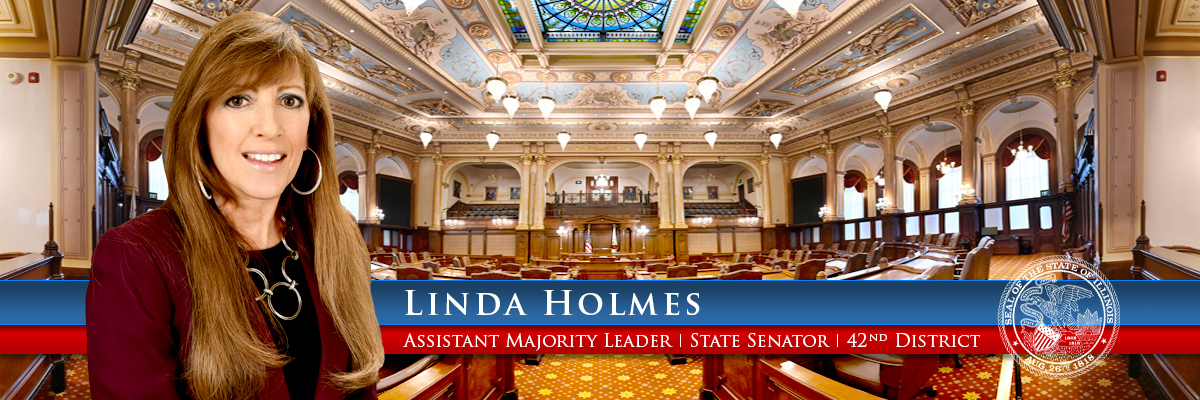Senate approves Holmes’ government reform measure; will provide for election of Fox Metro Water Reclamation trustees
- Details
- Category: Latest
 SPRINGFIELD – State Senator Linda Holmes (D-Aurora) passed a measure to address the election of trustees for the Fox Metro Water Reclamation District on Wednesday. Senate Bill 100 requires the trustees be elected rather than appointed. The bill had been vetoed by the governor in August 2018 and has been brought back to and approved in the Senate Local Government Committee.
SPRINGFIELD – State Senator Linda Holmes (D-Aurora) passed a measure to address the election of trustees for the Fox Metro Water Reclamation District on Wednesday. Senate Bill 100 requires the trustees be elected rather than appointed. The bill had been vetoed by the governor in August 2018 and has been brought back to and approved in the Senate Local Government Committee.
“I believe it is important that those who represent the citizens of our communities should be elected and not appointed,” Holmes said. “This bill provides for trustee candidates to go on the ballot during consolidated elections. It represents government reform that will better serve water quality needs in the future for people in the Fox River Valley.”
Holmes hopeful for local funds in Pritzker’s first budget proposal
- Details
- Category: Latest
 SPRINGFIELD –Messages of budgetary stability and restored economic health are what State Senator Linda Holmes (D-Aurora) took away from Gov. JB Pritzker’s state budget speech this afternoon with his proposals for the upcoming state budget year, which covers July 1, 2019, through June 30, 2020.
SPRINGFIELD –Messages of budgetary stability and restored economic health are what State Senator Linda Holmes (D-Aurora) took away from Gov. JB Pritzker’s state budget speech this afternoon with his proposals for the upcoming state budget year, which covers July 1, 2019, through June 30, 2020.
Holmes was encouraged to hear Pritzker acknowledge the state’s dire need for a capital plan, after ten years without timely action on necessary infrastructure maintenance, repairs and new construction.
“We desperately need a stable, ongoing plan, and I’m getting input from my municipalities and school districts on their most urgent needs,” Holmes said. “The governor and I agree this issue requires us to do more than just fix what’s broken. I hope to see specific plans in the coming weeks that will invest in our infrastructure, create jobs and boost our economy to meet future challenges.”
Local Lawmakers Holmes, Kifowit disappointed Oswego left out of property tax relief grants
- Details
- Category: New Releases
 SPRINGFIELD- On Tuesday, the Illinois State Board of Education announced that 28 Illinois school districts are eligible to receive a Property Tax Relief Grant for fiscal year 2019. The grant covers a portion of local property tax reductions up to the statutory limit.
SPRINGFIELD- On Tuesday, the Illinois State Board of Education announced that 28 Illinois school districts are eligible to receive a Property Tax Relief Grant for fiscal year 2019. The grant covers a portion of local property tax reductions up to the statutory limit.
Oswego District 308 was among 373 districts who applied for the relief but did not make the short eligibility list. Lawmakers Sen. Linda Holmes (D-Aurora) and Rep. Stephanie Kifowit (D-Oswego) learned of the outcome and reacted with concerns for students and local property taxpayers.
“I’m disappointed our districts won’t have this resource to support local schools and taxpayers,” Sen. Holmes said. “Seeing the number and amount of this year’s relief grants, I believe the formula needs some modifications to make the system more fair and equitable going forward.”
Holmes sworn in for new term as state senator
- Details
- Category: Latest
 SPRINGFIELD – State Senator Linda Holmes (D-Aurora) was sworn into office on Wednesday as the Illinois Senate officially began a new session.
SPRINGFIELD – State Senator Linda Holmes (D-Aurora) was sworn into office on Wednesday as the Illinois Senate officially began a new session.
“I am ready to get to work again as we start 2019 and the 101st Illinois legislative session,” said Holmes. “I will continue working to increase local government control, economic development and government efficiency, to address health and environmental issues, and to support the working people of the 42nd district.”
Holmes has served in the Senate since 2007.
More Articles …
Page 59 of 86




